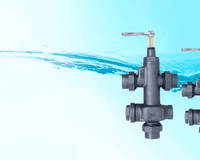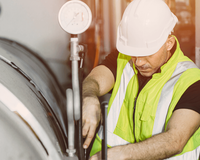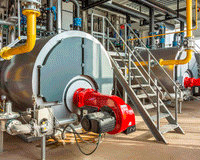Factors that affect the performance of your boiler
In an industrial environment, the energy efficiency of boilers will never be 100%, after all there will always be energy losses during fuel combustion.
Essentially in fire tube boilers, efficiency ranging from 80 to 85% is excellent and 65 to 75% is normal. The problem occurs when this efficiency falls much below this, forcing the industry to make an immediate correction if it does not want to lose money.
In this case, there are some factors that most affect the energy efficiency of your boiler, which you should be aware of:
Relationship between steam produced and fuel volume
Excess air in your boiler is not desirable, as it increases heat loss and reduces the length of the flame. Excess air in small quantities causes incomplete combustion and the formation of more CO, soot and smoke, reducing the boiler's performance and causing fouling in the gas pipes.
Percentage of boiler purges
Excessive purging increases the boiler's energy waste. A lack of purging will cause scale build-up, which will also compromise efficiency.
Feed water temperature
In boilers, the colder the feed water, the higher the fuel consumption.
Calorific value of fuel (moisture content)
When fuel with a high moisture content is burned, some of the water will evaporate, requiring a certain amount of energy. Naturally, the boiler's performance will be reduced.
Ineffective treatment of boiler supply water
In boilers, even the most modern and automated ones, lower quality supply water requires a higher percentage of bottom discharges, that is, it requires more water to be thrown out in order to make up for faults or problems with water treatment, compromising performance.
Unregulated boiler
A poorly regulated boiler tends not to burn fuel completely, consequently generating a lot of CO and particulate matter, reducing efficiency.
Tips for saving fuel and increasing the performance of your boiler
Based on the factors presented above, you should adopt some strategies to increase the boiler's performance and at the same time save fuel.
The first step to increasing the performance and reducing fuel consumption of your boiler is to analyze the amount of air received by your equipment, making it ideal. In addition to periodically cleaning the inside of the gas pipes.
Another recommendation is to monitor the gases resulting from combustion (CO², O² and CO). In addition to checking whether the heat is being used to its full potential, this measurement also allows you to control the level of pollution that the boiler is generating.
The highest boiler efficiency also depends on controlling the temperature of the boiler gases . For very low temperatures, the recommendation is to adopt insulation techniques, using more noble materials, such as stainless steel.
Effective boiler feedwater treatment is also necessary to increase boiler efficiency. By doing so, you will have less waste with bottom discharge, improving your boiler's performance.
Carry out internal cleaning of the boiler and preheater flame/gas tubes
Finally, there is a need to opt for more energy-efficient fuels . When these fuels have reduced humidity, the calorific value will be higher, increasing the energy released by this material.
Therefore, efficient management of fuel quality is essential for greater boiler performance, requiring care in preparation, transportation, storage and use.
In other words, there are countless opportunities to improve steam generation and reduce fuel costs for your boiler. These range from small monitoring and management processes to the adoption of essential operational management practices.
Want to know more? Then visittheMBX Blog and check out other points that can help you increase the performance of your boiler.




